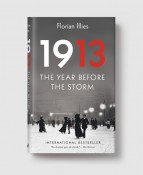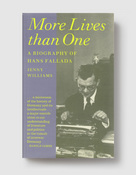
List price: $18.95
- Pages811
- ISBN9781933633923
- Publication dateMay, 2010
- Categories
- Booksellers
- Media
- Academics & Librarians
Wolf Among Wolves
Hans Fallada
translated by Philip Owens
restored and with additional translations by Thorsten Carstensen and Nicholas Jacobs
”His most ambitious novel… deeply moving… he has evoked more than one can bear, but not more than it is necessary to learn, to keep and to understand.”—Alfred Kazin, The New York Times
Wolf Among Wolves is a sprawling saga of the collapse of a culture—its economy and government—and the common man’s struggle to survive it all. Set in Weimar Germany soon after Germany’s catastrophic loss of World War I, the story follows a young gambler who loses all in Berlin, then flees the chaotic city, where worthless money and shortages are causing pandemonium. Once in the countryside, however, he finds a defeated German army that has deamped there to foment insurrection. Somehow, amidst it all, he finds romance—it’s The Year of Living Dangerously in a European setting.
Fast-moving as a thriller, fascinating as the best historical fiction, and with lyrical prose that packs a powerful emotional punch, Wolf Among Wolves is the equal of Fallada’s acclaimed Every Man Dies Alone as an immensely absorbing work of important literature.
***

Melville House HybridBooks combine print and digital media into an enhanced reading experience by including with each title additional curated material called Illuminations — maps, photographs, illustrations, and further writing about the author and the book.
The Melville House Illuminations are free with the purchase of any title in the HybridBook series, no matter the format.
Purchasers of the print version can obtain the Illuminations for a given title simply by scanning the QR code found in the back of each book, or by following the url also given in the back of the print book, then downloading the Illumination in whatever format works best for you.
Purchasers of the digital version receive the appropriate Illuminations automatically as part of the ebook edition.
”The ideal summer read.” —Katherine Powers, The Boston Globe
”An unmissably brilliant portrait of Berlin before the Nazis.” —The Times of London
”His most ambitious novel… deeply moving… he has evoked more than one can bear, but not more than it is necessary to learn, to keep and to understand.”—Alfred Kazin, The New York Times
”Fallada handles [the characters] not morbidly but with a Hogarthian exuberance and a tough humor, infusing into even those dying spirits the life of his copious imagination… Fallada’s best book.” —The New Yorker (1938)
“An outstanding novel [about] an especially grim period in German history, the Weimar Republic….Much more entertaining than the tomes produced by the usual German suspects, Mann, Hesse, Grass, Böll.” —Tibor Fischer, The Telegraph
”Fallada can be seen as a hero, a writer-hero who survived just long enough to strike back at his oppressors.” —Alan Furst
”Fallada deserves high praise for having reported realistically, so truthfully, with such closeness to life.” —Herman Hesse
”Out of the multitude of episodes and a large cast of characters, the picture of post-War Germany during the terror of the inflation period, comes into reality, as in almost no other book we have had… A human document–and a moving picture of a Germany gone mad.” —Kirkus Reviews
“What other living German novelist shares with Fallada the power to grip the reader on the first page and hold him unremittingly through 1100 more?”—Bayard Q. Morgan, World Literature Today (1938)
”[P]ortrays German society in its most vivid detail…a rewarding read.” —Seattle Post-Intelligencer
”Hans Fallada’s eloquent, urgent voice could not be silenced…” —Washington Times
PRAISE FOR EVERY MAN DIES ALONE
”A signal literary event of 2009 has occurred… Rescued from the grave, from decades of forgetting…[Every Man Dies Alone] testifies to the lasting value of an intact, if battered, conscience…In a publishing hat trick, Melville House allows English-language readers to sample Fallada’s vertiginous variety…[and] the keen vision of a troubled man in troubled times, with more breadth, detail and understanding…than most other chroniclers of the era have delivered. To read Every Man Dies Alone, Fallada’s testament to the darkest years of the 20th century, is to be accompanied by a wise, somber ghost who grips your shoulder and whispers in your ear: “This is how it was. This is what happened.”—The New York Times Book Review
”Has the suspense of a John le Carré novel, and offers a visceral, chilling portrait…”—The New Yorker





